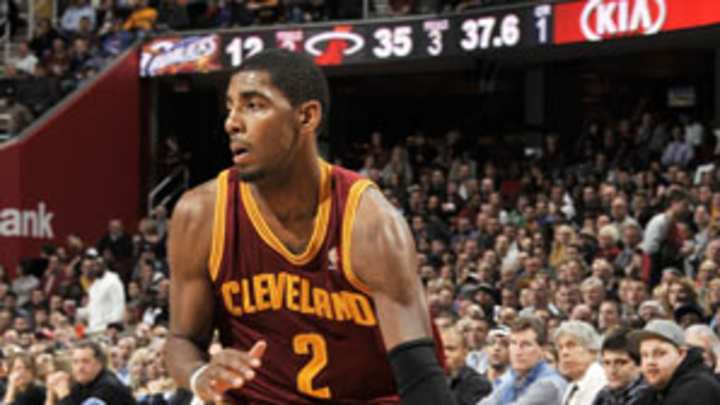Cavaliers rookie Irving stands out, even in NBA's point-guard era

Three years ago, I was assigned a story for the magazine about a high-school basketball game between Mater Dei and St. Benedict's. The magazine does not usually feature high-school basketball, but this was no ordinary game. Mater Dei, in Southern California, was 23-0 and ranked No. 1 in the nation. St. Benedict's, in New Jersey, was 19-0 and ranked No. 2. They were meeting at Mater Dei, in something called the Nike Extravaganza, which one college scout compared to the Super Bowl. The teams combined for more than 10 Division-I prospects, with two committed to North Carolina, two to Texas, and others to UCLA, USC, Stanford and Pittsburgh. St. Benedict's best player was a precocious power forward named Tristan Thompson who called the showdown "the top of the mountain."
The extravaganza was on a Saturday and we spent the week interviewing coaches and players from both sides. On Wednesday, the teams had tuneups, Mater Dei at home against Santa Margarita, St. Benedict's at Rutgers against St. Patrick. I watched Mater Dei thrash Santa Margarita, and during the game, checked to make sure St. Benedict's dispatched St. Patrick.
As expected, it was a blowout. St. Benedict's, though, lost by 26 points. They still flew to the West Coast afterward, and took on Mater Dei 72 hours later, but the stakes were not the same. The story was junked. I later learned how exactly it fell apart. St. Patrick unleashed a new point guard on St. Benedict's, who had only played in five games but scored 21 points against the juggernaut from Jersey. His name was Kyrie Irving.
"Kyrie was a mystery man," said Thompson, for a profile of Irving in last week's issue of Sports Illustrated. "You heard about him, but you didn't know what he could do." Thompson flashed back to that high-school game nine months ago, when he sat next to Irving on a bus, headed to the Prudential Center in Newark for the NBA draft. The Cavaliers selected Irving first, with a pick acquired from the Clippers, and Thompson fourth, with a pick earned from their own 19-63 record. Now, Irving and Thompson both live in apartments in downtown Cleveland, carpooling to practice in the suburbs. On game days, they drive 25 minutes to Krispy Kreme, where they fetch doughnuts for their teammates.
The Cavaliers are trying to treat them like 19-year-old rookies instead of franchise saviors. But Irving makes it hard sometimes, averaging 18.6 points and 5.2 assists per game, and nailing three game-winning shots, including Wednesday night's end-to-end layup in Denver. He stands out even in this era of the point guard. Derrick Rose and Russell Westbrook may be more explosive drivers, and Rajon Rondo and Ricky Rubio more telepathic passers, but today's best young point guards are often unreliable shooters.
Irving separates himself because, in addition to his driving and passing, he shoots 48.3 percent from the field and 41.2 percent from three-point range. Not only is he better than his peers from the field, he is more than nine percentage points better from three. Rose is obviously stronger and Rondo probably quicker, but defenses cannot sag off Irving, so he has extra room to penetrate.
Cleveland has already lost 23 games this season and will drop many more. Power forward Anderson Varejao is still out with an injured wrist and the Cavaliers are still on the first floor of their rebuilding project. But what made Irving a mystery in high school is what makes him a fit in Cleveland. He spent his first two high-school seasons at Montclair Kimberley Academy, where grade-point average is more important than field-goal percentage. He came off the bench for his AAU team, the New Jersey Roadrunners, and once asked head coach Sandy Pyonin why he was getting any minutes at all. Thompson wondered what was wrong with Irving, since he didn't go to a better basketball school or play for a bigger AAU program. "That's what most guys do," Thompson said.
But Irving thrived in relative anonymity. He worked out every day at the Young Men's and Young Women's Hebrew Association, in a window-less basement gym where he played full-court games of one-on-one to 100 against Pyonin. At St. Patrick, he added late-night one-on-one against a Panamanian priest who lived across the street. Irving's desire for a larger stage took him to St. Pat's, Duke and the NBA after only 11 college games. But Montclair Kimberley coaches do not feel like Irving slighted them at all. Rather, he gave them two more years than they could have imagined.
There is no telling how long Irving will spend in Cleveland, but judging from his background, he won't be rattled by a couple seasons in the shadows. "I just love the game," Irving said. "Being in Cleveland adds to it."
Cavaliers head coach Byron Scott is grooming Irving the same way he did Chris Paul, trusting him with final shots in close games. Irving must score more than the Cavs would like, so his efficiency rating has dipped in recent weeks, but it remains higher than Magic Johnson's as a rookie. Irving will need a lot of help moving forward, from Thompson, Varejao and another high draft pick who turns into a scoring wing. Possible candidates range from North Carolina sophomore Harrison Barnes to Kentucky freshman Michael Kidd-Gilchrist. Oddly enough, Kidd-Gilchrist played with Irving at St. Patrick and was part of the team that took down St. Benedict's, a high-school game in New Jersey that could live forever in Cleveland.

Lee Jenkins joined Sports Illustrated as a senior writer in 2007. Since 2010 his primary beat has been the NBA, and he has profiled the league's biggest stars, including LeBron James and Kevin Durant.